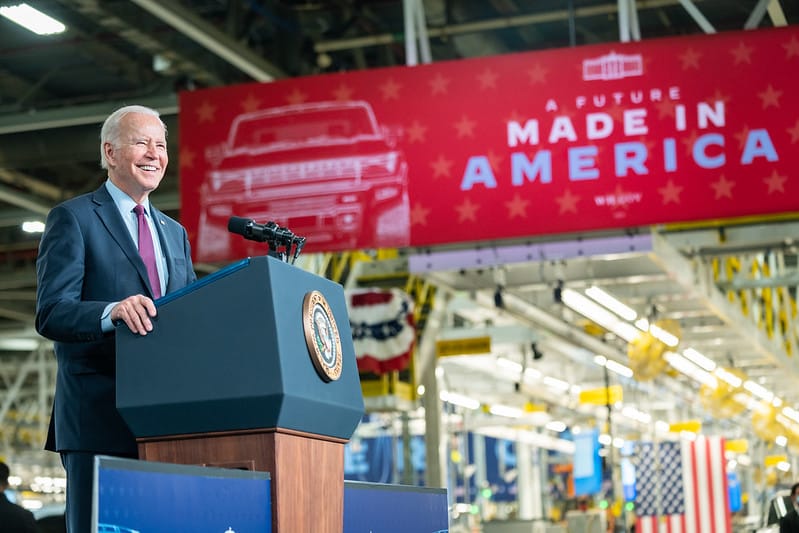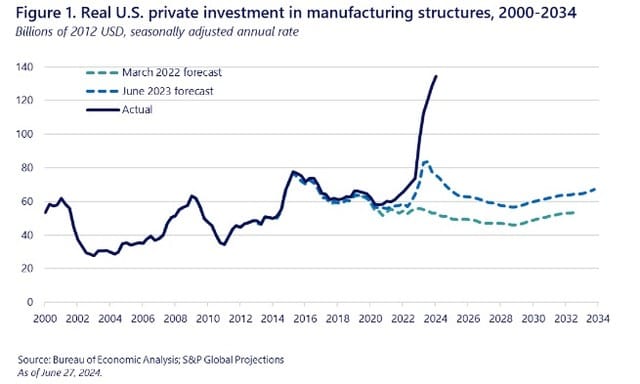This is why we cannot let the Quiet New Deal stay so quiet

If politicians don’t think they will get credit for reducing administrative burdens, they just won’t do it.
What do 11 down-on-their-luck factories being retrofitted to build EVs have in common with overdue raises for four million salaried workers or a billion dollars clawed back from millionaire tax cheats?
Well, all three are good news from the Biden Administration. They all haven’t made much news, especially compared to the cosmic revelation that Joe Biden is 81. And they’re all part of the Quiet New Deal.
You may recall that the Quiet New Deal is our attempt to explain the subtly radical way Joe Biden has reshaped government in favor of the people, to explain the administration’s accomplishments and what they will continue to accomplish in a second term. It’s also a direct alternative to Project 2025, the Christian Nationalist plan to replace the government with fascist lackeys who only service corporate and fundamentalist oligarchs.
The Quiet New Deal has three parts. One is investing in a cleaner America, which includes retrofitting factories paid for by the Inflation Reduction Act. Another is elevating workers, which includes raising the threshold for employers to pay workers for overtime work for the first time since… I can’t even find when. The third is optimizing government, which incorporates the controversial idea that rich people shouldn’t be able to cheat on their taxes.
Optimizing government may be the quietest part of The Quiet New Deal, and that’s saying something because it’s all still pretty quiet. Reducing administrative burdens lacks spectacles like factory openings or the president of the United States walking a picket line. And it doesn’t produce startling charts like this:

Rebuilding the IRS so it reins in the richest Americans and rolling out free e-file for taxes to all 50 states are the most visible aspects of improving the way government works. Many other innovations are far less noticeable, often by design.
And while that makes sense, it also presents a real threat to the future of reducing administrative burdens, explained Don Moynihan, a researcher who studies efforts to rid ourselves of needless obstacles that limit the good (or increase the harm) that we do together as government.
We spoke to Don last week about his supporting role in putting together the Last Week Tonight explainer on Project 2025. We also used the interview to ask him for his thoughts about the Quiet New Deal construct as it applies to his academic focus. He added a warning (in bold) that helps explain why focusing on smarter government hasn’t yet become something politicians haven’t felt driven to prioritize:
Don Moynihan: So I studied public management and I've studied administrations going back as far as the Clinton administration, and to my mind, the Biden administration has been the most attentive to how you make public services work, to how you make government actually responsive to members of the public. And that's occurred in a couple of different ways. Most of it has not been, you say "Quiet New Deal." So most of it has not been stuff that got picked up a lot in the media.
But for example, President Biden signed this cxecutive order on improving customer experience and increasing trust in government. And it included language about administrative burden. It included a lot of like really specific things that government agencies should be doing in terms of understanding the experience of the clients that they serve, using technology to improve that experiences. And then when they find success stories, sharing those success stories. I see real progress there. And I see Biden using the presidency to deal with an aspect of public policy that most presidents don't care about, which is implementation. Like how you actually turn the law into a real outcome that that people experience and value in a positive way. So I give him credit for that. I hope he continues to get to work on that agenda. it has been consequential in ways that I think is not given much attention. And he's often fighting entrenched forces to do so. If you take something like student loan forgiveness, he had a model of student loan forgiveness that would have been really well designed and implemented before the Supreme Court jumped in and said, "You can't do this." He has encouraged states to reduce Medicaid loss by using things like automatic renewals for people who are on public health insurance, because we know that when people have to renew once a year in the United States to maintain their public health insurance that's a point where a lot of them simply don't get the paperwork in, and they lose coverage.
And Biden has pushed states to expand the use of data to enable automatic. There's a lot of these, little examples where he's been pushing the use of smart practices to make government services better. I think that the issue is that if you're a politician you wonder if there's a payoff for doing this.
I think in the long run, It improves people's experience of government. It gives them one less thing to complain about. If they have sometimes a positive experience, they're pleasantly surprised. But if we don't pay attention to that, politicians as rational actors will just spend more of their time and political capital on other topics instead. And so I, really hope that there is some political payoff to this.
I could keep talking about other examples like the use of direct file so people can, pay their taxes online without using TurboTax and save a little money, or renewing their passports online, everyday frictions we encounter when we interact with government. So Biden gets, a high grade in my book on that. I just hope more of the rest of the public recognizes that.
Member discussion